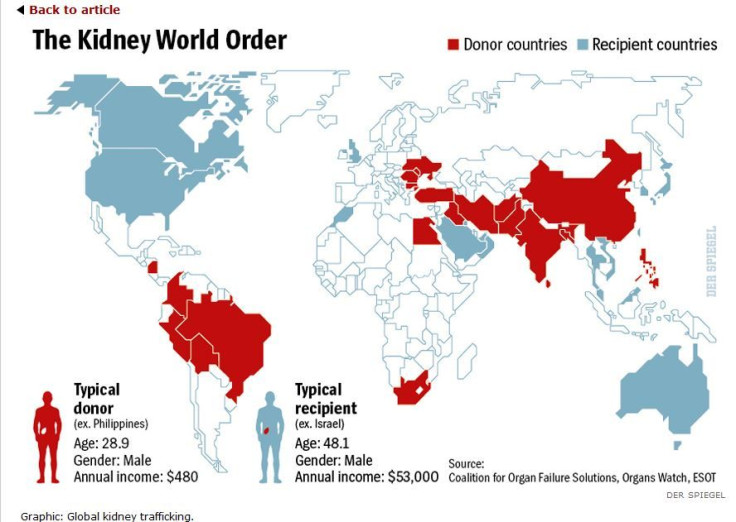Organ Trafficking: An International Crime Infrequently Punished

Among the familiar urban myths that circulate in major cities is this one: you go out drinking one night and wake in an expensive hotel room bathtub filled with ice and your arm is hooked up to an IV drip. Your head aching, you explore your tender lower back and discover surgical scars. You just had your kidney illegally harvested, or stolen, to be sold for thousands of dollars on the black market.
Reality
Unfortunately, the glossy scenario described above may be largely mythical but the practice of illegal harvesting of organs most definitely is not. According to a report produced by the United Nations, "Trafficking in organs is a crime that occurs in three broad categories." Organs which are commonly traded are kidneys and the liver. In the first category of criminal organ trade, traffickers force or deceive victims into giving up an organ. In the second category, victims formally or informally agree to sell an organ and are cheated because they are not paid for the organ or are paid less than the promised price. And in the third category, vulnerable people, including as migrants workers, the homeless, or the illiterate, are treated for an ailment which may not even exist and then their organs are removed without their knowledge.
"Trafficking in organ trade is an organized crime, involving a host of offenders," states the United Nations report; those involved include recruiters who identify vulnerable persons, transporters, hospital/clinic staff, medical professionals, and middlemen and contractors.
In 2012, The Guardian reported that "the illegal trade in kidneys has risen to such a level that an estimated 10,000 black market operations involving purchased human organs now take place annually, or more than one an hour, World Health Organization experts have revealed." Since the 2008 economic downturn, in fact, the incidence of organ trafficking has reputedly increased.
Price Paid
Not only are organs obtained from people who have died but also from those who are clinically brain dead but whose body functions are maintained artificially. In fact, living organ donation is becoming more frequent. This practice, though, has been discouraged both for safety reasons and to protect live donors from exploitation. Kidney donation by well-selected living donors can carry negligible risks, so long as rigorous selection procedures, careful surgery, and follow up of the donor and recipient are assured. In all cases, doctors match donors to recipients to reduce the risk of transplant rejection.
In 2010, of the 106,879 known organ transplant operations, those performed with illegally harvested organs may be as high as 10 percent. "The WHO estimation is that currently organ transplantation covers only 10 percent of the global need - it's a high estimation," said Dr. Luc Noel of the World Health Organization (WHO). "Unscrupulous individuals and organizations are profiteering from this situation. The stakes are so big, the profit that can be made so huge, that the temptation is out there."
A report by Global Financial Integrity estimates that illegal organ trade generates between $600 million and $1.2 billion in profits per year with a span across many countries. Donor countries include impoverished nations in South America, Africa, Asia, and Eastern Europe. Recipient countries include the U.S., Canada, Australia, the United Kingdom, Israel, and Japan. "Wealthy patients are paying up to £128,500 (roughly $191,028 today) for a kidney to gangs, often in China, India and Pakistan, who harvest the organs from desperate people for as little as £3,200 (roughly $4,756 today)," reports the Daily Mail.
International Conspiracy
A black market has developed in many poorer countries allowing and enabling those who are wealthy enough to buy organs and so exploit those who are desperate enough to sell them. It is also the case that people will travel to other countries to buy organs they can't find at home. Globalism combined with supply and demand economics means that developed countries, which demand more organs than can be domestically supplied, seek out donors in developing nations to provide organs and meet their demands, often illegally.
A 1984 U.S. law, the National Organ Transplant Act of 1984 (NOTA), bans the sale of human organs. Yet the first person ever convicted of organ trafficking in the U.S. only occurred in 2011, as reported in Bloomberg News. At that time, Levy Izhak Rosenbaum pleaded guilty to three counts of organ trafficking and one count of conspiracy in a federal court in New Jersey. Three people in New Jersey paid him a total $410,000 to arrange the sale of kidneys from healthy donors, he told the court, while an undercover FBI agent paid him $10,000.
Significantly, the U.S. did not charge or identify any of the people who bought kidneys through Rosenbaum.
Sources: Shimazono Y. The state of the international organ trade: a provisional picture based on integration of available information. World Health Organization Bulletin. 2007.
Dotimas J. Innovations in Stem Cell Research: The Solution to Organ Trafficking? Harvard College Global Health Review. 2013.



























